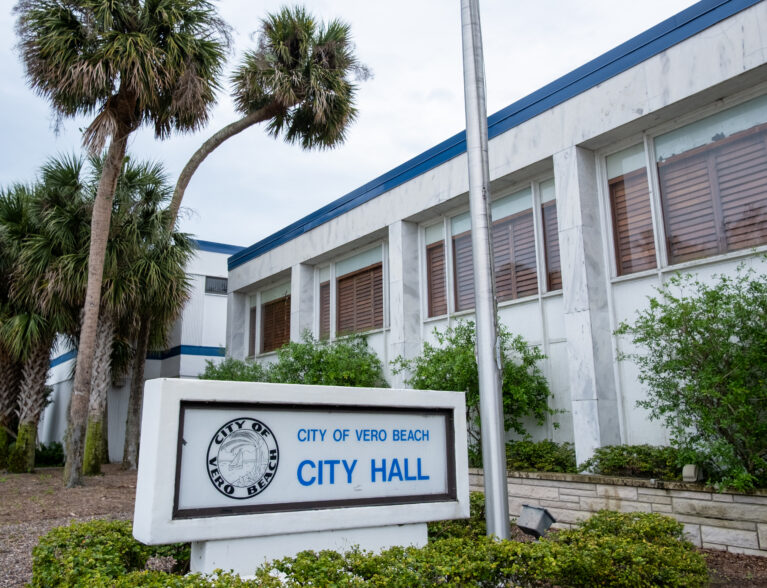
The City of Vero Beach finally filed a copy of its 2022-23 audit report findings and audited financial statements with the Florida Office of the Auditor General on Monday – five days later than city officials claimed – beginning the process of regaining access to state funds.
But for some reason – possibly because the audit reveals concerns about inadequate internal bookkeeping controls, millions in deficit spending and a decrease in Vero’s net financial position – the city did not want Vero Beach 32963 to have a copy of the full 130-page audit report before press time.
Assistant City Clerk and records custodian Heather McCarty, who normally is super-responsive and quick to provide any records requested from the city, said on Monday she had been instructed not to release a copy of the audit.
Fortunately, the Florida Auditor General’s Local Government Reviews & Special Audits Coordinator David Ward, CPA, provided this newspaper with a copy of the full, unredacted public document so Vero taxpayers could be informed of what the audit showed.
Amid a fairly boring report, only three things jumped out as reasons why higher-ups at City Hall might not want their audit in the headlines this week.
First of all, contrary to reports in the regional Gannett newspaper, the city did not file its audit and supplemental documents to the state on April 30. Vero City Manager Monte Falls on Friday celebrated before a civic group gathering, proclaiming that city staff had met its self-imposed April 30 deadline to complete and submit the audit.
But Ward, from his computer in Tallahassee in the Office of the Florida Auditor General, said that the audit was actually received by the state five days later on Monday.
The staff of the Florida Joint Legislative Auditing Committee confirmed the same, saying, “The Auditor General did not receive the audit until today. In addition, DFS has not yet received the AFR (Annual Financial Report).”
There was no “extension,” an email from the JLAC staff sent at 11:11 a.m. Monday said, referring to Falls’ claim of some phantom pending or possible extension that would save Vero from forfeiting one month of half-cent sales tax money, estimated to be about $130,000.
Falls did not respond before press time when asked who told him the city might get an extension.
“The half-cent sales tax would have been lost. We do not have the amount at this time; we are supposed to receive an update from Department of Revenue early this month that should include the amount lost by Vero Beach,” the JLAC staff said.
When asked if there is a turnaround time of days or weeks between when Vero Beach files the required audit/financial reporting documents and when JLAC lifts the enforcement measures for non-compliance, the JLAC staff responded, “Once DFS receives the Annual Financial Report (AFR), we will notify DOR and DFS to stop enforcement.”
What the city did send to the Florida Auditor General on April 30 was a three-page cover letter from auditors Cherry Bekaert saying they had completed their part of the work on the audit, with a note saying the audit itself should be forthcoming on May 2. But according to the JLAC staff, that letter satisfied none of the city’s outstanding reporting requirements.
The second thing in the 130-page financial documents the city probably hoped this newspaper did not see was an “X” marking a check-the-blank section on page 109 of the report.
When auditors Cherry Bekaert were asked about the City of Vero Beach’s “Internal control over financial reporting,” the auditors had to either check Yes or No as to whether “material weaknesses” were identified. They marked Yes with an X.
Falls continues to blame former finance director Steve Dionne – not Falls’ own failure to supervise and monitor Dionne’s work, or to notice numerous and mounting fiscal red flags – for all the city’s fiscal reporting woes. “It’s my responsibility, but it’s not my fault,” Falls said publicly last week about the audit debacle.
The third interesting thing about the statement of financial position notes is that the City of Vero Beach spent $2.3 million more money than it took in during the 2022-23 fiscal year.
“The City’s revenues for governmental funds, excluding other financing sources, were $31.1 million. The expenditures for governmental funds were $33.4 million,” page 4 of the audit report states.
The Executive Office of the Governor’s DOGE Team specifically asked about governments operating at a deficit in its March inquiry letter. But in its April 7 and April 8 responses to the DOGE Team, Vero said it had nothing to disclose on that item.
“The fiscal year ended with a net decrease in General Fund balance of $3.5 million,” the audit report states on page 11.
According to the audit, the city is holding onto ample reserves in its non-utility funds – much of that from the proceeds of the sale of Vero Electric to Florida Power & Light, while the Vero Beach City Council raised property taxes by double digits last year.
“At the close of the current fiscal year, the governmental funds reported combined ending fund balances of $62.6 million, a decrease of $2.8 million in comparison with the prior year.
Approximately $10.3 million, or 16 percent, of this total amount is available for spending at the government’s discretion (unassigned fund balance),” page 4 of the report said.
Auditors also questioned the cost accounting of some capital projects at the Vero Beach Regional Airport, but the Federal Aviation Administration regulates the airport and it is a self-sustaining enterprise fund, meaning no property tax dollars from the city’s general fund go to prop up the airport. That note is probably the least of the city’s concerns.



